This article was medically reviewed by Tu Anh Vu, DMD. Dr. Tu Anh Vu is a board certified dentist who runs her private practice, Tu's Dental, in Brooklyn, New York. Dr. Vu helps adults and kids of all ages get over their anxiety with dental phobia. Dr. Vu has conducted research related to finding the cure for Kaposi Sarcoma cancer and has presented her research at the Hinman Meeting in Memphis. She received her undergraduate degree from Bryn Mawr College and a DMD from the University of Pennsylvania School of Dental Medicine.
This article has been viewed 53,061 times.
A beautiful smile can brighten anyone's day and boost your own confidence levels. Keep your teeth and gums healthy to avoid gum disease or unsightly spots.
Steps
Keeping Healthy Gums
-
1Brush your teeth for two minutes twice a day.[1] This is the number one step you can take to care for your teeth. Using a soft or medium bristle toothbrush and fluoride toothpaste, be sure to brush in the morning and evening every day. Set a timer for two minutes or listen to a short song to keep time.
- Don't "scrub" your teeth hard — hold the brush like a pencil and brush in light circles and vertical strokes which will prevent and stop gum recession. Focus on the gums as well. Your gums are a delicate tissue that act like a barrier against bacteria.[2]
- Hold the brush at a 45 degree angle, just along the edge of the gum line.
- Be sure to brush your tongue and the roof of your mouth as well.
- Replace your brush every two to three months or when the bristles become worn.
-
2Floss once a day. Flossing is still the most effective way to remove food and plaque from between your teeth, where it can irritate your gums if not removed.[3] Be sure to get each tooth from each side.[4]
- The floss should form a "C" shape around the tooth.
- Do not push too far into your gums — goes as deep as the gum line but no further.
- Do at least four vertical movements which will extract the bacteria underneath your gums.
Advertisement -
3Use antibacterial mouthwash to clean your whole mouth. Your teeth only make up 25% of your mouth, and you need to keep the whole thing clean to prevent infections that lead to unhealthy gums. Use antibacterial mouthwash a few times a week, but avoid mouthwash with alcohol in it, as this causes more harm than good.[5]
- Another option is a chlorhexidine mouthwash. Do not use it for longer than two weeks in a row as it might stain your teeth
-
4Snack on "gum-friendly" foods. Sugary snacks, gum, and sodas all promote the growth of unhealthy bacteria in your mouth which lead to gum disease. Potato chips, crackers, and dried fruit can also stick to your teeth, and the residue can cause damage if it is not wiped away quickly. Since most people do not brush their teeth after snacking, these particles can remain on teeth for hours.
- Foods rich in calcium, like dairy, are great for tooth health.
- Vegetables, hummus, and fresh fruit are all healthy alternatives for your mouth.
- If you do eat sugary foods, rinse your mouth out with water afterwards.[6] Wait at least half an hour before brushing if you ate sugary food or fizzy drinks.
-
5Stay hydrated. Saliva is crucial for keeping your mouth healthy and the bacteria in balance. Drink 4 – 8oz of water every hour — especially when you feel thirsty or your mouth is dry.[7]
-
6
Preventing Gum Disease
-
1Know if you are at risk of gum disease. There are several risk factors for gum disease that are out of your control. If you have any of the following factors, be sure to talk to your dentist about ways to prevent gum disease:
- Diabetes
- Family history of gum disease
- Hormonal changes in women and girls
- Medications that lead to dry mouth
- Immune-affecting diseases like cancer or AIDS
- Poor oral hygiene habits[10]
-
2Avoid smoking cigarettes. Smoking is one of the biggest risk factors for gum disease in the world, and can prevent successful treatment. The easiest way to avoid gum disease is to quit smoking.[11]
- Combined with alcohol, the effects get much worse. Avoid smoking and drinking simultaneously.
-
3Get a professional cleaning twice a year.[12] Almost all gum disease can be prevented by cleaning away plaque from your teeth, and your dentist or oral hygienist is the best equipped person to do so. Be sure to keep you your regular visits and you respect the indications given after the treatment.
-
4Know the symptoms of gum disease. Unchecked, gum diseases can damage the tissue and cartilage in your mouth and lead to tooth decay. If you experience any of the following symptoms chronically you should make an appointment with your dentist immediately:
- Bad breath that won’t go away
- Red or swollen gums
- Tender or bleeding gums
- Painful chewing or a burning feeling of the gums
- Loose teeth
- Sensitive teeth
- Receding gums (teeth appear "longer" than usual)[13]
-
5Take action with your dentist before gum disease progresses. Gingivitis is when the gums become inflamed or swollen, and is not particularly dangerous by itself; however, if it is not cared for soon enough it can progress to periodontitis, where the gums detach from the tooth, allowing bacteria to enter and damage your teeth. If your gums don't feel better with regular brushing and flossing then you may need antibiotics or surgery to prevent disease.
Expert Q&A
-
QuestionCan I get healthier gums just by brushing my teeth?
 Joseph Whitehouse, MA, DDSDr. Joseph Whitehouse is a board certified Dentist and the Former President of the World Congress on Minimally Invasive Dentistry (WCMID). Based in Castro Valley, California, Dr. Whitehouse has over 46 years of dental experience and counseling experience. He has held fellowships with the International Congress of Oral Implantology and with the WCMID. Published over 20 times in medical journals, Dr. Whitehouse's research is focused on mitigating fear and apprehension patients associate with dental care. Dr. Whitehouse earned a DDS from the University of Iowa in 1970. He also earned an MA in Counseling Psychology from California State University Hayward in 1988.
Joseph Whitehouse, MA, DDSDr. Joseph Whitehouse is a board certified Dentist and the Former President of the World Congress on Minimally Invasive Dentistry (WCMID). Based in Castro Valley, California, Dr. Whitehouse has over 46 years of dental experience and counseling experience. He has held fellowships with the International Congress of Oral Implantology and with the WCMID. Published over 20 times in medical journals, Dr. Whitehouse's research is focused on mitigating fear and apprehension patients associate with dental care. Dr. Whitehouse earned a DDS from the University of Iowa in 1970. He also earned an MA in Counseling Psychology from California State University Hayward in 1988.
Board Certified Dentist Brushing your teeth will absolutely contribute to gum health, but you do need to see a dentist if you suspect you have a gum disease. When it comes to brushing, make sure that you're using a fluoridated toothpaste. Also, don't scrub your teeth super hard when you're brushing. It's common for people to walk into the dentist's office with big grooves in their teeth because of toothbrush abrasion. What you want to do is brush from the gum onto the tooth in a downward stroke while using a slight rolling motion with your hand. This way, you get around your teeth without brushing across them.
Brushing your teeth will absolutely contribute to gum health, but you do need to see a dentist if you suspect you have a gum disease. When it comes to brushing, make sure that you're using a fluoridated toothpaste. Also, don't scrub your teeth super hard when you're brushing. It's common for people to walk into the dentist's office with big grooves in their teeth because of toothbrush abrasion. What you want to do is brush from the gum onto the tooth in a downward stroke while using a slight rolling motion with your hand. This way, you get around your teeth without brushing across them. -
QuestionHow can I get rid of bad breath and receding gums?
 Cristian Macau, DDSDr. Macau is an oral surgeon, periodontist, and aesthetician at Favero Dental Clinic in London. He received his DDS from Carol Davila University of Medicine in 2015.
Cristian Macau, DDSDr. Macau is an oral surgeon, periodontist, and aesthetician at Favero Dental Clinic in London. He received his DDS from Carol Davila University of Medicine in 2015.
Doctor of Dental Surgery Motivate yourself to sustain a good and complete oral hygiene using your toothbrush, dental floss, an oral irrigator and mouthwash rinses. Also change your diet including whole grain bread, fruits, vegetables and less sugary foods. Avoid smoking or alcohol and reduce the amounts of fizzy drinks. Visit your dentist as requested and always check your teeth and gums in the mirror to see any changes.
Motivate yourself to sustain a good and complete oral hygiene using your toothbrush, dental floss, an oral irrigator and mouthwash rinses. Also change your diet including whole grain bread, fruits, vegetables and less sugary foods. Avoid smoking or alcohol and reduce the amounts of fizzy drinks. Visit your dentist as requested and always check your teeth and gums in the mirror to see any changes.
Warnings
- Never try to "overbrush" by scrubbing hard or making your gums bleed — you cause more harm than good.⧼thumbs_response⧽
References
- ↑ Tu Anh Vu, DMD. Board Certified Dentist. Expert Interview. 10 April 2020.
- ↑ Joseph Whitehouse, MA, DDS. Board Certified Dentist. Expert Interview. 9 April 2020.
- ↑ Tu Anh Vu, DMD. Board Certified Dentist. Expert Interview. 10 April 2020.
- ↑ Joseph Whitehouse, MA, DDS. Board Certified Dentist. Expert Interview. 9 April 2020.
- ↑ http://www.emaxhealth.com/1/looks-ingredient-mouthwash-and-avoid-oral-cancer
- ↑ http://www.urmc.rochester.edu/encyclopedia/content.aspx?ContentTypeID=1&ContentID=1409
- ↑ http://www.nidcr.nih.gov/oralhealth/Topics/GumDiseases/Periodontal%28Gum%29DiseaseCausesSymptomsandTreatments_mobile.htm
- ↑ Tu Anh Vu, DMD. Board Certified Dentist. Expert Interview. 10 April 2020.
- ↑ Joseph Whitehouse, MA, DDS. Board Certified Dentist. Expert Interview. 9 April 2020.
- ↑ http://www.nidcr.nih.gov/oralhealth/Topics/GumDiseases/Periodontal%28Gum%29DiseaseCausesSymptomsandTreatments_mobile.htm
- ↑ Joseph Whitehouse, MA, DDS. Board Certified Dentist. Expert Interview. 9 April 2020.
- ↑ Tu Anh Vu, DMD. Board Certified Dentist. Expert Interview. 10 April 2020.
- ↑ http://www.nidcr.nih.gov/oralhealth/Topics/GumDiseases/Periodontal%28Gum%29DiseaseCausesSymptomsandTreatments_mobile.htm
About This Article
To get healthy gums, brush your teeth with fluoride toothpaste for 2 minutes twice every day. Hold the brush at a 45° angle against your gum line and brush in light circles and vertical strokes. Floss once each day, and rinse out your mouth with antibacterial mouthwash several times a week. Try to snack on gum-healthy foods like fresh fruits and vegetables, as well as calcium-rich foods like milk and cheese. Avoid sugary snacks, but if you do eat something sweet, rinse your mouth out with water afterward. Read on for tips from our Dental co-author on how professional cleanings can help prevent gum disease!
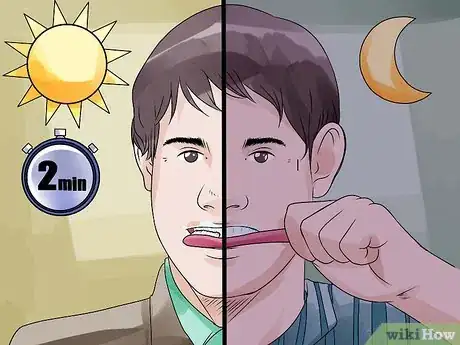


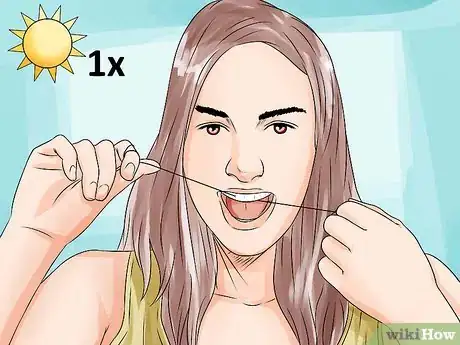
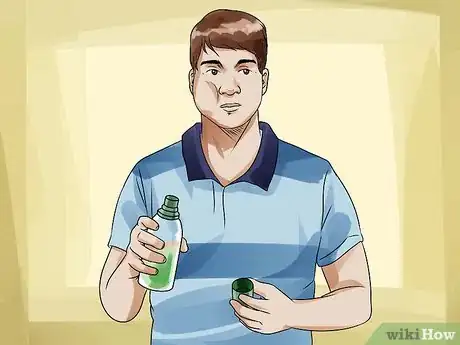
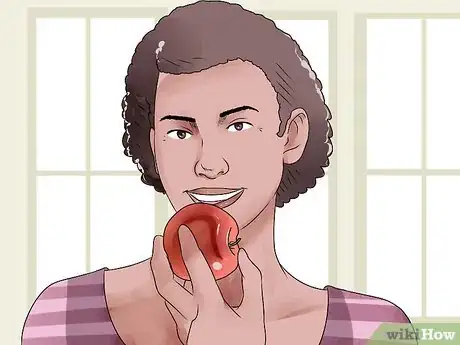
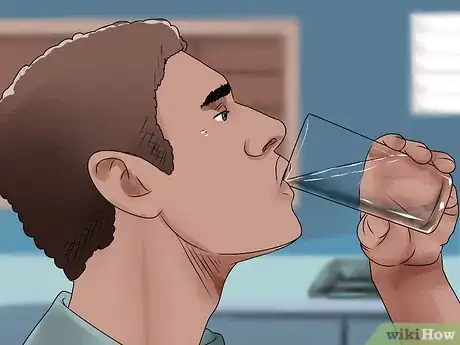
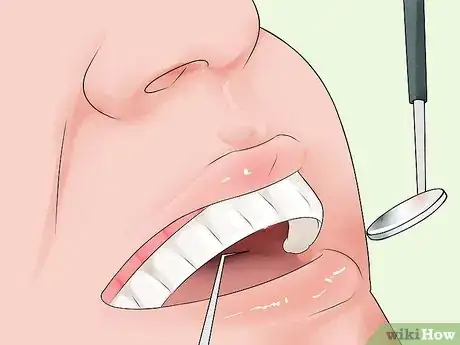
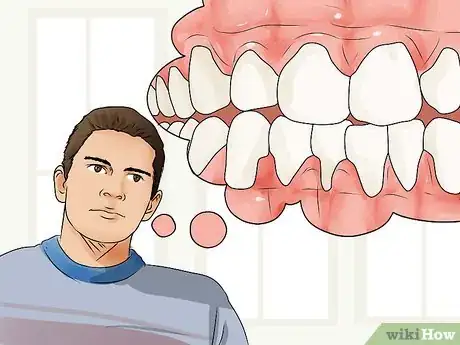
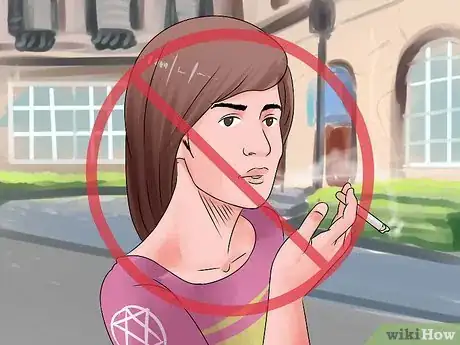
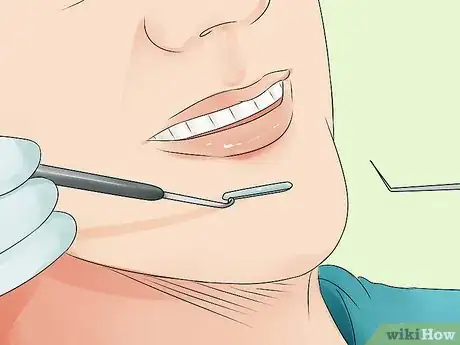
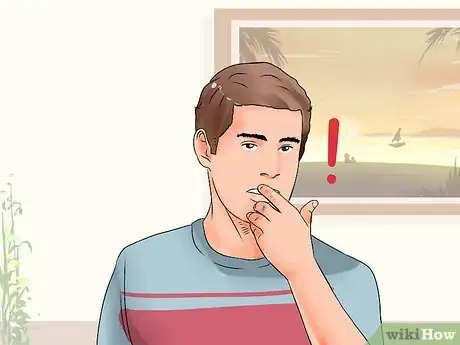
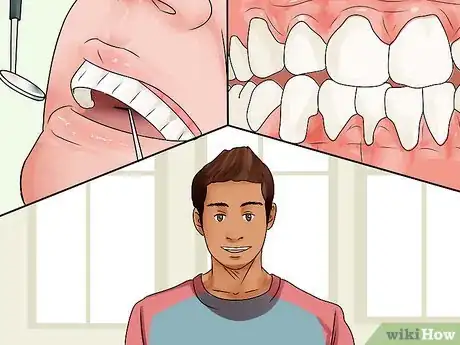


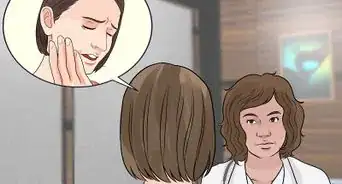

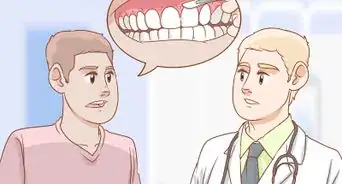
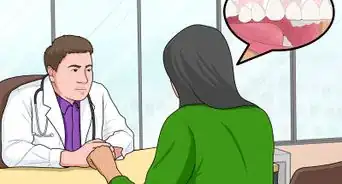
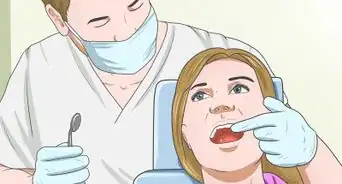
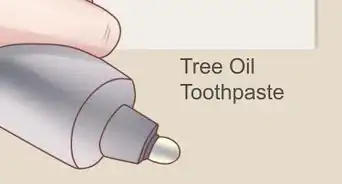


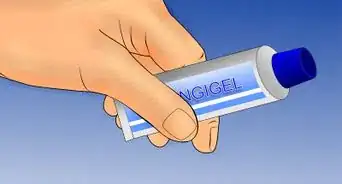
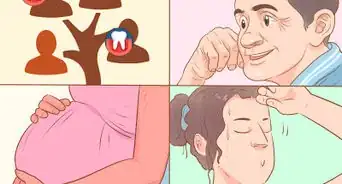
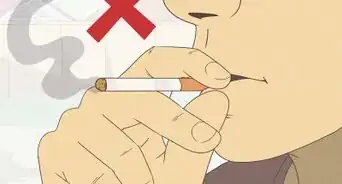







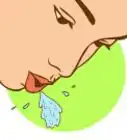





































Medical Disclaimer
The content of this article is not intended to be a substitute for professional medical advice, examination, diagnosis, or treatment. You should always contact your doctor or other qualified healthcare professional before starting, changing, or stopping any kind of health treatment.
Read More...